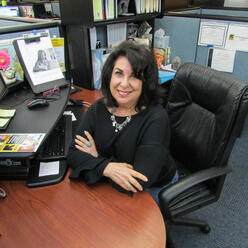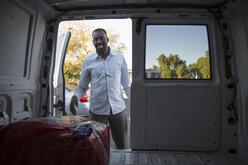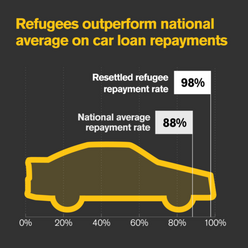
“Seriously, I had no idea. It was a total shock!”
Phyllis Korogodsky, a loan officer with the IRC in Phoenix, was recently recognized by the Center for Economic Opportunity (CEO) with a resolution at their quarterly board meeting. The resolution read: “...[T]he CEO Board recognizes and thanks Phyllis Korogodosky for her exceptional service in her role as a Loan officer and Financial Coach for refugees in Arizona.” CEO is a subsidiary of the IRC that offers participants access to a range of affordable financial products that can accelerate clients’ upward economic mobility. Recently certified by the U.S. Treasury as a Community Development Financial Institution (CDFI), the Center offers credit-building, auto, and business loans to low-income borrowers.
At the IRC in Phoenix, Phyllis runs the Consumer Lending Program, which offers loans and financial coaching services to refugee clients. While the IRC has been offering various loans to refugees for many years, this program is relatively new. IRC offices in Phoenix, Salt Lake City, and San Diego began the programs in 2016. Out of 194 loans that have been made in Phoenix, Phyllis has personally packaged 106 of them.

Phyllis believes that this work is essential for refugee resettlement. “In America, it’s so important to have a good credit score to access credit. Having access to credit is really an asset.” Additionally, she recognizes that this work is valuable for the entire Phoenix community. “Refugees will end up being consumers and contributing to the wealth and health of the financial situation of the community in which they live. When refugees are successful, it positively impacts the people around them, their communities, and their neighborhoods.”
The United States financial system can be a huge adjustment for many refugees – and refugees often need financial literacy and coaching soon after arrival. One challenge refugees face upon arrival is that in order to travel to the United States, refugees receive a loan for airfare from the International Organization for Migration (IOM). This loan can be quite expensive and refugees are expected to begin repayment within 6 months of arrival. “If they’re not paying it, [the IOM loan] can be a huge detriment to their credit score,” notes Phyllis. Through the coaching process, Phyllis is able to coach refugees on the importance of paying their loans on time, including the travel loan.
The Consumer Lending Program offers two types of loans. The first loan, a Credit Building Loan, provides a no interest, six month loan, allowing refugees to build or improve their credit. The second loan provides low-interest auto loans up to $8,000. As these loans are processed, financial coaching is provided to help refugees manage their credit scores. Despite many hurdles, refugees eventually find success with their finances in the United States. The Credit Building Loan makes a huge difference. “They’re always excited when we pull their credit score and they see that it is moving up,” said Phyllis. For refugees with no credit score, the Credit Building Loan can often move their credit score from 0 to 650.

Once refugees have established some credit, an auto loan can provide a means of transportation for work and family. A recent study by the IRC found that refugees are more likely to repay their auto loans than the average American. “Resettled refugees who received low-income auto loans from the IRC in California, Arizona and Utah had a much lower default rate—1.95 percent compared to the U.S. average of nearly 12 percent.“ You can read more here: https://www.rescue.org/FastandFinanced
Phyllis is proud of her work and excited to continue it. “I’ve met so many clients and been able to work with them. [This program] keeps me going. It gets me out of bed. I should be retired, but this work is important to me.”
Support the work of the IRC in Phoenix, including our Consumer Lending program: https://help.rescue.org/donate/us-phoenix-az
Story by Stanford Prescott, Community Engagement Coordinator.